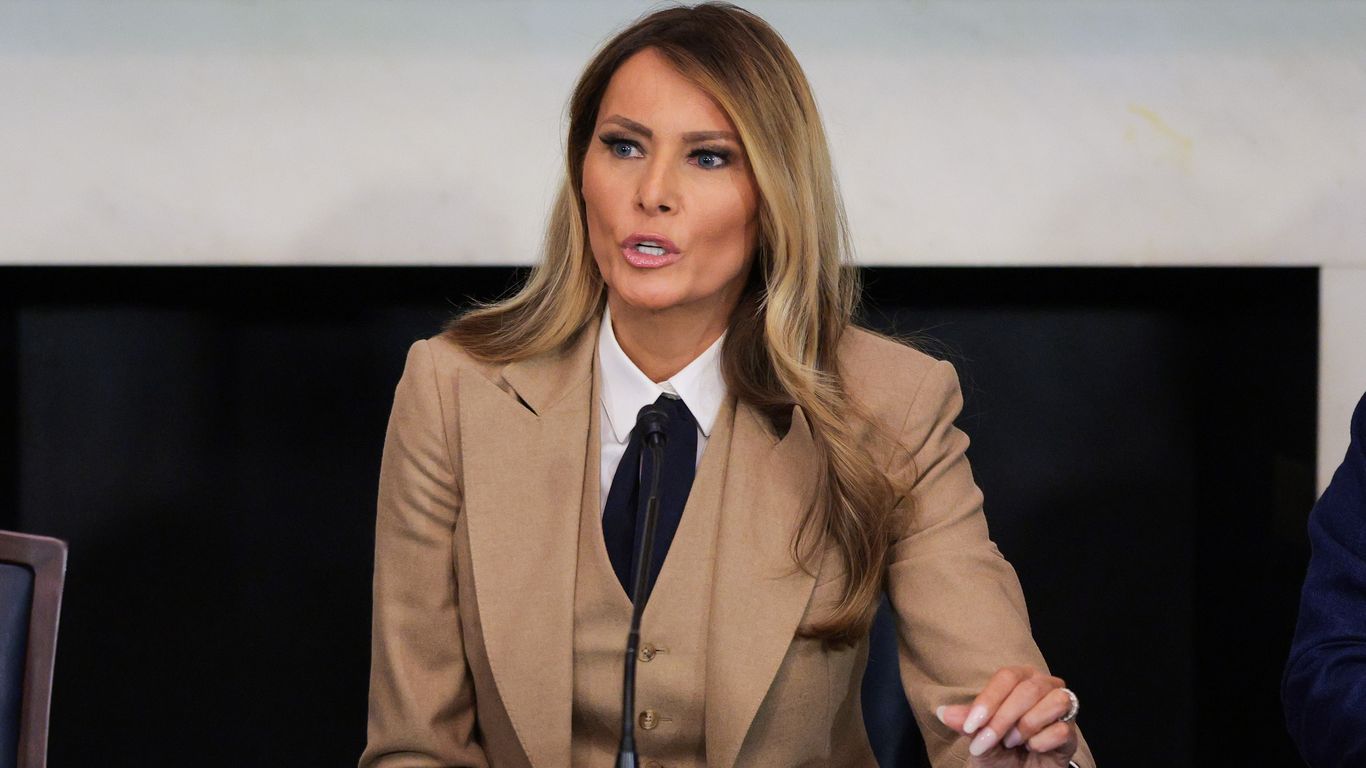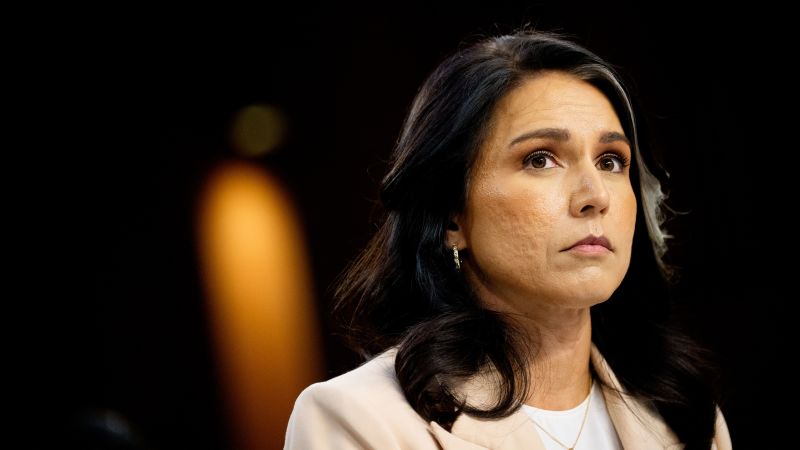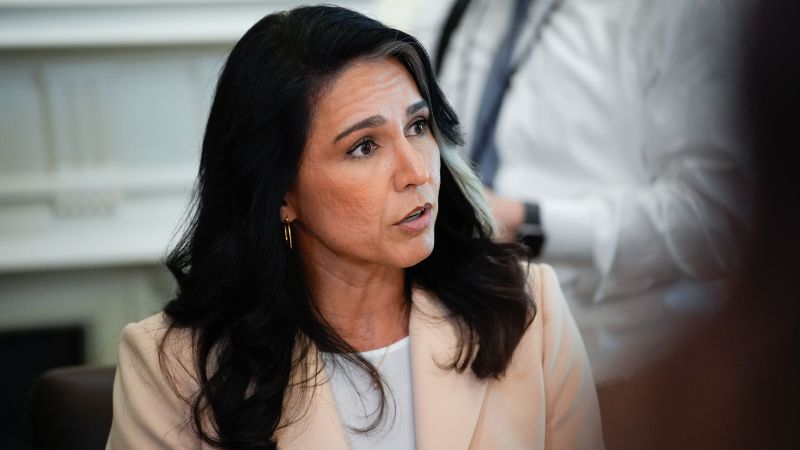Tulsi Gabbard Plans to Cut Staff and Revoke Security Clearances
#tulsi_gabbard #national_intelligence #staff_cuts #security_clearances #politics

Introduction
Tulsi Gabbard, the director of national intelligence, has recently announced plans to cut the staff by half. This drastic move is expected to have significant implications for the US intelligence community. The decision comes as a surprise, as Gabbard has been a vocal advocate for increasing intelligence funding and resources in the past.
Key Details
In addition to the staff cuts, Gabbard also plans to revoke the security clearances for 37 US intelligence officials who served under the previous administrations of Biden and Obama. This includes top officials such as former CIA director John Brennan and former director of national intelligence James Clapper. Gabbard has stated that these individuals have been "politicizing intelligence" and their clearances will be revoked due to their "inappropriate conduct."
Impact
This move has sparked controversy and concerns about the potential impact on national security. Some argue that cutting the intelligence staff in half and revoking clearances for experienced officials could weaken the US's ability to gather and analyze intelligence. There are also concerns about the politicization of intelligence and the potential impact on the US's relationships with other countries. Only time will tell how these changes will affect the US intelligence community and their ability to protect the nation.
About the People Mentioned
Tulsi Gabbard
Tulsi Gabbard is an American politician and military officer notable for her diverse career in public service. Born on April 12, 1981, in Leloaloa, American Samoa, she is the first American Samoan and the first Hindu member of the U.S. Congress. Gabbard graduated with a B.S. in business administration from Hawaii Pacific University in 2009. Gabbard began her political career at the age of 21 when she was elected to the Hawaii State Legislature. She later served on the Honolulu City Council from 2011 to 2012. In 2012, she was elected to the U.S. House of Representatives, representing Hawaii's 2nd Congressional District until 2021. During her tenure in Congress, she supported progressive causes and was a strong advocate for veterans' rights. Gabbard was also one of the first female combat veterans to serve in Congress, having deployed to Iraq and Kuwait as part of the Hawaii Army National Guard. In 2019, Gabbard launched a presidential bid for the 2020 Democratic nomination, emphasizing her military background and commitment to progressive values. She suspended her campaign in March 2020 and later endorsed Joe Biden. Gabbard left the Democratic Party in 2022, criticizing it as an "elitist cabal of warmongers," and officially joined the Republican Party in October 2024 after endorsing Donald Trump. Currently, Tulsi Gabbard serves as the Director of National Intelligence, a position she began in February 2025. Her appointment followed a nomination by President Trump and confirmation by the Senate. This role marks a significant shift in her political career, as she now plays a key role in national security and intelligence. Despite her military background, her appointment to the DNI position has been scrutinized due to her lack of experience in intelligence and her controversial statements on U.S. foreign policy.
Joe Biden
Joseph Robinette Biden Jr., commonly known as Joe Biden, is the 46th President of the United States, serving from 2021 to 2025. Born on November 20, 1942, in Scranton, Pennsylvania, Biden moved to Delaware with his family in 1953. He graduated from the University of Delaware in 1965 and Syracuse University Law School in 1968. Before entering national politics, Biden served on the New Castle County Council and later became one of the youngest U.S. Senators at the age of 29, representing Delaware from 1973 to 2009. During his Senate career, Biden chaired the Senate Judiciary Committee and Foreign Relations Committee. He played a crucial role in drafting several significant pieces of legislation, including the Violence Against Women Act and the Violent Crime Control and Law Enforcement Act. Biden also oversaw several U.S. Supreme Court confirmation hearings. In 2008, he was chosen by Barack Obama as his vice presidential running mate, serving two terms as the 47th Vice President of the United States. In 2020, Biden won the presidential election, defeating incumbent President Donald Trump. As President, he focused on rebuilding America's international leadership and implementing policies to address economic recovery and social issues. Biden's presidency concluded on January 20, 2025, when Donald Trump returned to office. Recently, Biden announced that he had been diagnosed with Stage 4 prostate cancer. Despite his health challenges, Biden remains a figure of national interest, with ongoing discussions about his political legacy and influence. His dedication to public service and his efforts to expand opportunities for Americans have been central themes throughout his career.
Barack Obama
Barack Hussein Obama II, born August 4, 1961, in Honolulu, Hawaii, is an American politician, lawyer, and author who served as the 44th President of the United States from 2009 to 2017[2][3][8]. He is widely recognized as the first African American to hold the nation’s highest office, marking a historic milestone in U.S. history[1][2][3]. Obama’s early life was shaped by a diverse heritage—his mother, Stanley Ann Dunham, was a white American from Kansas, and his father, Barack Obama Sr., was a Kenyan economist[2][4][9]. He spent part of his childhood in Indonesia before returning to Hawaii, where he was raised primarily by his maternal grandparents[4][5]. Obama attended Columbia University, graduating with a degree in political science, and later earned a law degree from Harvard Law School, where he became the first African American president of the Harvard Law Review[2][3][4]. After law school, he worked as a community organizer in Chicago, a civil rights attorney, and a lecturer at the University of Chicago Law School[2][3]. He entered politics as a member of the Illinois State Senate (1997–2004) and then represented Illinois in the U.S. Senate (2005–2008)[2][3]. His 2008 presidential campaign, built on themes of “hope” and “change,” resonated with voters during a period of economic uncertainty and war[2]. Obama defeated Republican John McCain to become president and was reelected in 2012, defeating Mitt Romney[3][5]. As president, Obama’s major domestic achievements included the Affordable Care Act (expanding health insurance coverage), economic stimulus measures in response to the 2008 financial crisis, and the repeal of “Don’t Ask, Don’t Tell,” allowing LGBTQ individuals to serve openly in the military[2][4]. In foreign policy, he oversaw the withdrawal of U.S. troops from Iraq, authorized the operation that killed Osama bin Laden, and pursued the normalization of relations with Cuba[4][6]. He was awarded the Nobel Peace Prize in 2009 for his efforts to strengthen international diplomacy[1][2]. Since leaving office, Obama has remained active in public life through his foundation, speaking engagements, and media projects, though he has generally maintained a lower public profile than some predecessors[2]. He continues to be a prominent voice on issues such as democracy, climate change, and civic engagement. As of late 2025, Obama is not holding any official government position but remains a symbol of progress in American politics and a respected figure in global discourse[2].
John Brennan
John O. Brennan is a career intelligence officer who served as the Director of the Central Intelligence Agency (CIA) from 2013 to 2017 under President Barack Obama[1][3]. Born and raised in New Jersey, Brennan developed a strong sense of patriotism and public service, influenced by his Irish immigrant father and Catholic upbringing[4]. He graduated from Fordham University in 1977 with a degree in political science, studied at the American University in Cairo, and earned a master’s in government with a focus on Middle Eastern studies from the University of Texas at Austin in 1980[3][6]. Brennan began his CIA career in 1980 as an analyst, specializing in Middle Eastern affairs and counterterrorism[1][6]. He held several significant roles, including serving as the daily intelligence briefer for President Bill Clinton, CIA station chief in Riyadh during the 1996 Khobar Towers bombing, chief of staff to CIA Director George Tenet, and deputy executive director of the CIA[1][2]. In the early 2000s, he played a central role in the creation and leadership of the National Counterterrorism Center, integrating intelligence from multiple agencies to combat terrorism[1][2][6]. After retiring from the CIA in 2005, Brennan briefly led private sector firms, including The Analysis Corporation, before returning to government service as Assistant to the President for Homeland Security and Counterterrorism from 2009 to 2013, where he helped shape U.S. responses to terrorism, cyber threats, and pandemics[1][2][6]. His nomination as CIA Director in 2013 marked a return to the agency he had served for 25 years[1][3]. Post-government, Brennan has remained active as a commentator, academic, and consultant. He is a Distinguished Scholar at the University of Texas at Austin, a Distinguished Fellow at Fordham Law School’s Center on National Security, and a senior national security and intelligence analyst for NBC and MSNBC[3]. He also advises private sector companies and contributes to public discourse on intelligence and security issues[3]. Brennan is known for his expertise in counterterrorism, Middle Eastern affairs, and intelligence integration. His career reflects a commitment to public service, with a focus on adapting U.S. intelligence to evolving global threats. While not currently holding a government position, he remains a respected voice in national security debates and continues to influence policy discussions through media and academic engagements[3].
James Clapper
James Robert Clapper Jr. is a retired U.S. Air Force lieutenant general and intelligence official who served as the fourth Director of National Intelligence (DNI) from August 2010 to January 2017. In this role, he led the entire U.S. Intelligence Community and served as the principal intelligence advisor to President Barack Obama. His career in military and intelligence service spanned over five decades, beginning with his enlistment in the U.S. Marine Corps Reserve in 1961 and culminating as director of the Defense Intelligence Agency (DIA) and senior uniformed intelligence officer in the Department of Defense[2][6]. Clapper flew 73 combat support missions over Laos and Cambodia during the Southeast Asia conflict and held key intelligence leadership positions, including director of intelligence for U.S. Forces Korea, Pacific Command, and Strategic Air Command. After retiring from the military in 1995, he worked in the private sector focusing on intelligence community services and returned to government service as the first civilian director of the National Imagery and Mapping Agency, transforming it into the National Geospatial-Intelligence Agency. He also served as Under Secretary of Defense for Intelligence prior to becoming DNI[2][3][4][5]. During his tenure as DNI, Clapper oversaw intelligence support to major operations such as the raid that killed Osama bin Laden in 2011 and emphasized integration across the intelligence community. His leadership helped establish joint intelligence centers and improve real-time intelligence support for policymakers and military commanders. Clapper has received numerous awards, including three National Intelligence Distinguished Service Medals, two Defense Distinguished Service Medals, the Air Force Distinguished Service Medal, and the presidentially conferred National Security Medal[1][3][4][5]. Since retiring from government, Clapper has remained engaged in public discourse on intelligence and security issues, including through speaking engagements and affiliations with academic institutions. He published a memoir titled *Facts and Fears: Hard Truths from a Life in Intelligence* and remains a recognized figure in U.S. national security circles[7].
About the Organizations Mentioned
US Intelligence Community
The U.S. Intelligence Community (IC) is a coalition of 18 federal agencies and organizations responsible for collecting, analyzing, and disseminating intelligence to protect U.S. national security. Established in the aftermath of World War II, the IC was formally organized by the National Security Act of 1947, which created the Central Intelligence Agency (CIA) and laid the foundation for a coordinated intelligence apparatus. Over the decades, the IC has evolved to address shifting global threats, from Cold War espionage to modern cyber warfare and transnational terrorism. The IC’s primary mission is to provide policymakers, military leaders, and law enforcement with timely, accurate intelligence on foreign and domestic threats. This includes monitoring state adversaries like China, Russia, Iran, and North Korea, as well as nonstate actors such as terrorist groups and transnational criminal organizations. The IC also plays a critical role in safeguarding critical infrastructure, countering cyberattacks, and protecting U.S. economic and technological interests. Key achievements include uncovering major security threats, supporting military operations, and advancing intelligence-sharing among agencies. The IC’s annual Worldwide Threat Assessment, released each year, offers a public window into the most pressing risks facing the United States, ranging from cyber intrusions and weapons proliferation to health and environmental challenges. Today, the IC is led by the Director of National Intelligence (DNI) and includes agencies such as the CIA, FBI, NSA, and DIA. It operates with a focus on technological innovation, leveraging advanced data analytics, artificial intelligence, and cyber capabilities to stay ahead of emerging threats. The IC’s work is essential for maintaining U.S. global leadership and ensuring the safety of American citizens and interests in an increasingly complex and interconnected world.
CIA
## Overview The Central Intelligence Agency (CIA) is the principal civilian foreign intelligence service of the United States federal government, specializing in collecting, analyzing, and providing intelligence on global affairs to inform national security decisions[2][5]. Headquartered at the George Bush Center for Intelligence in Langley, Virginia, the CIA is a key member of the U.S. Intelligence Community and reports to the Director of National Intelligence[5]. Its mission is to protect the nation and advance its security interests by delivering objective intelligence to the president, the National Security Council, and other policymakers—without making policy recommendations itself[2][5]. ## History and Evolution Established in 1947 by the National Security Act, the CIA was born out of the need for centralized intelligence after World War II. Over the decades, its focus has shifted: from Cold War espionage and counterintelligence, to a post-9/11 emphasis on counterterrorism, and more recently, to countering state actors like Russia and China[4]. The agency has undergone several transformations, adapting to new threats and technologies, and has been involved in covert operations, paramilitary activities, and support for foreign governments[5]. ## Key Achievements The CIA has played pivotal roles in shaping global events, from Cold War-era regime changes and intelligence-sharing with allies, to disrupting terrorist networks and uncovering foreign interference in U.S. elections[4][5]. It is responsible for coordinating human intelligence (HUMINT) across the Intelligence Community and has helped establish intelligence services in many countries[5]. The agency also produces the CIA World Factbook, a comprehensive public resource on country data and statistics used by governments, businesses, and journalists worldwide[1][7]. ## Current Status and Structure As of 2025, the CIA operates through multidisciplinary mission centers, integrating analysis, operations, technical, and digital capabilities across five directorates[2]. It does not have a law enforcement function but collaborates with other agencies on counter
World Health Organization
The World Health Organization (WHO) is a specialized agency of the United Nations, established in 1948, with a mandate to promote global health, coordinate international responses to public health threats, and set standards for health policies and interventions[2]. Headquartered in Geneva, Switzerland, WHO operates in over 150 countries, working with governments, NGOs, and other partners to advance health equity, strengthen health systems, and respond to health emergencies. ## What WHO Does WHO’s core activities include monitoring global health trends, setting international health standards, providing technical assistance to countries, and serving as a forum for scientific and policy discussions on health issues[2]. The organization publishes influential reports such as the annual **World Health Statistics**, which tracks progress toward Sustainable Development Goals (SDGs) and provides a global “health report card”[1][8]. WHO also maintains the Model List of Essential Medicines, guiding countries on which drugs are most critical for public health[7]. In addition, WHO leads global campaigns on issues ranging from infectious disease eradication to noncommunicable diseases (NCDs), maternal and child health, and health emergencies[2][6]. ## History and Key Achievements WHO’s history is marked by landmark achievements, including the eradication of smallpox, near-eradication of polio, and the development of an Ebola vaccine[2]. The organization played a pivotal role in responding to the COVID-19 pandemic, coordinating global research, vaccine distribution, and public health guidance. In May 2025, WHO member states adopted the world’s first **Pandemic Agreement**, a historic step to improve international coordination and equity in future health crises[4]. WHO also spearheads initiatives like the Triple Billion Targets (healthier lives, universal health coverage, and protection from health emergencies) and technical policy packages targeting tobacco, alcohol, salt, and trans fat reduction[1][2]. ## Current Status and Notable Aspects WHO is currently implementing its **Fou
OpenAI
OpenAI is a leading artificial intelligence research and deployment company founded in 2015 with the mission to ensure that artificial general intelligence (AGI)—AI systems generally smarter than humans—benefits all of humanity[1][2]. Initially established as a nonprofit, OpenAI’s goal has always been to advance safe and broadly beneficial AI technologies. In 2019, OpenAI created a for-profit subsidiary to scale its research and deployment efforts while keeping mission-aligned governance. As of October 2025, this structure evolved into the OpenAI Foundation (nonprofit) governing the OpenAI Group, a public benefit corporation (PBC). This unique corporate form legally binds OpenAI Group to prioritize its mission alongside commercial success, ensuring broader stakeholder interests are considered[1]. The Foundation holds equity in the Group, aligning incentives for long-term impact and growth. Microsoft owns approximately 27% of OpenAI Group, with employees and investors holding the rest[1]. OpenAI is renowned for pioneering breakthroughs in large language models and AI applications. Its products like ChatGPT revolutionized human-computer interaction by enabling natural language conversations and task automation. OpenAI continuously innovates by integrating AI into business tools—for example, its recent launch of “company knowledge” in ChatGPT Business harnesses AI to aggregate and analyze internal company data from apps like Slack, Google Drive, and GitHub, enhancing workplace productivity and decision-making[3]. Key achievements include advancing AI safety research, reducing hallucinations in language models, and expanding AI’s accessibility through products like Codex and ChatGPT Atlas (a browser with ChatGPT integration)[2]. OpenAI’s balanced governance model and cutting-edge research position it uniquely at the intersection of technology innovation and ethical AI development, making it a focal point in business and technology news globally.















